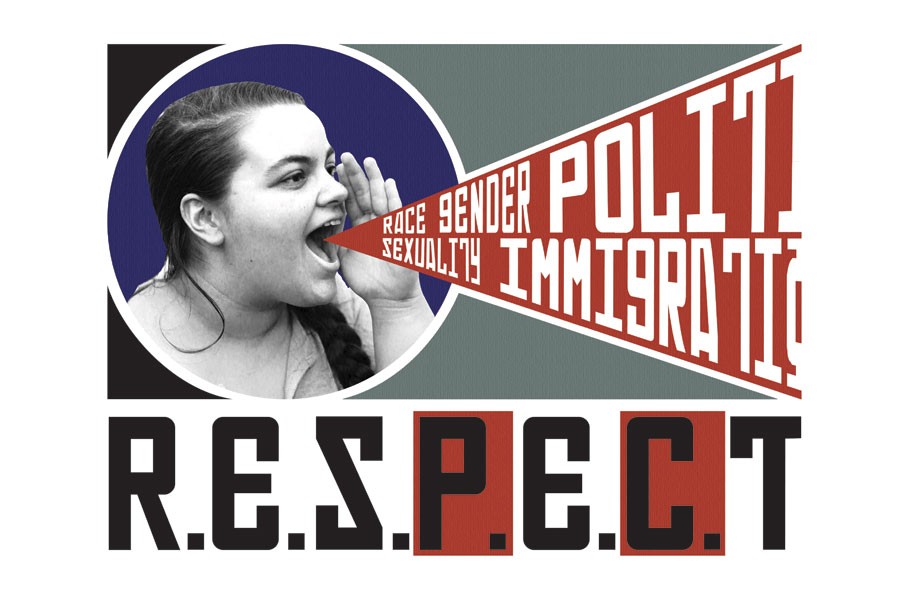R.E.S.P.E.C.T.
Students discuss pros, cons of political correctness
President Linda Bennett announced at the beginning of the semester that the university will focus on the concept of “civility.” Bennett said this focus promotes healthy discussion despite critical differences in opinion, beliefs and culture. This week, The Shield explored the idea of political correctness on campus and asked students whether that conflicts with the concept of free speech.
Evan Phillips has to watch his steps wherever he goes.
As a member of the LGBTQ community, he said he’s often been the recipient of slurs for his identity.
“(The university environment) is mostly decent, but there are some places or times that are not safe for me to dress appropriately,” the sophomore political science major said.
Phillips said the insults are purely a result of ignorance.
“I used to get really angry, but that would result nowhere,” he said. “Now I try to have a civil conversation with people.”
Merriam-Webster defines “politically correct” as “agreeing with the idea that people should be careful to not use language or behave in a way that could offend a particular group of people.”
Political correctness is important, he said, but free speech prevails.
“Even though it’s rude to talk a certain way, you have a choice,” he said. “We can’t stop everyone from expressing themselves.”
According to the Pew Research Center in November 2015, 40 percent of millennials believe it is OK to limit speech if it offends minority groups.
The percentage of millennials contrasts from the 27 percent of Generation X (people born from the early 1960s to 1980s), 24 percent of Boomers (born right after World War II) and 12 percent of Silents (born between mid-1920s to early 1940s) who support speech limitation.
“I don’t think our generation is too sensitive,” Phillips said. “We’re just more aware of reality.”
Dampering down diversity
Freshman Andrew Palombit doesn’t think political correctness is a problem at USI.
“I haven’t heard anybody insult people,” said Palombit, who is also a political science major.
Palombit said worrying about offending others shouldn’t inhibit someone from saying how they feel.
“The concept of political correctness dampers down the substance of what we’re saying,” he said. “It can conceal the problems.”
Palombit said there should be no limitations on free speech as long as no one is seriously threatened.
“As soon as you add restrictions, you limit the debate people can have to defend their ideas,” he said. “You have the right to offer rebuttals.”
The USI Student Handbook states the university is “a forum for the free expression of ideas.” The document later states, “At USI, we believe that civility is important and is the result of an intentional choice of all members of the campus community.”
Adjunct Instructor David Rodenberg said a student freely expressed her ideas in one of his classes, but received verbal abuse about it in the hallway afterward.
The student had said “all lives matter,” which supporters of the “Black Lives Matter” movement opposed.
“When rights aren’t respected, you feel personally attacked,” Rodenberg said.
He said he dealt with the issue by assuring her that her opinion was valid. Then Rosenberg brought up the harmful attacks with the entire class. He said he stressed respect as necessary to have these sorts of discussion.
Rodenberg said political correctness has a lot of importance, but it can be taken too far.
“Political correctness is challenging,” he said. “Sometimes it’s used to ignore important differences between people. We live in a world of differences and diversity. We shouldn’t pretend like we’re the same.”
‘The sting and emotion’
Johanna Druen doesn’t shy away from controversial subject matter.
She recently decided she should be able to bring print pornography to her gender studies class, not for shock factor, but for education.
“You can’t talk about pornography if you’re not looking at it,” Druen said. “The way to do that is to bring it in and not treat it as a taboo topic.”
The gender studies and English instructor regularly holds round-table discussions in her classes and said the experience has been completely positive.
“I believe it’s not only important for students to voice their opinion, but for students to defend their positions in a rational and logical way,” she said. “I consider it to be part of my responsibility as an instructor.”
She said politically correctness helps take out the possibility of offending someone in the room.
“It’s taking the sting and emotion out of a topic and learning how to present those different opinions and values,” she said.
Ashley Evearitt said political correctness is necessary to make everyone feel comfortable on campus.
A staff therapist for the Counseling Center, Evearitt directs the Voices of Discovery group, which attempts to “enhance students’ understanding of intergroup/diversity issues.”
“Not everyone who arrives here at college knows how to treat others in a respectful way,” Evearitt said. “It’s our job as a university to teach that.”
She said political correctness isn’t a one-time choice, it’s a learning curve.
“My goal is to make people welcome at every place in the university and for every student to feel safe,” Evearitt said. “Political correctness is how we make spaces more welcome and having an awareness of terms that make things unsafe.”
She said, ultimately, the decision to be politically correct is up to the individual.
“Free speech is a legal term. You need the right language to build bridges,” Evearitt said. “I can’t force people to speak a certain way. It’s up to them.”



